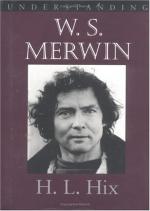|
This section contains 2,963 words (approx. 10 pages at 300 words per page) |

|
SOURCE: "Epilogue," in Poetry as Labor and Privilege: The Writings of W. S. Merwin, University of Illinois Press, 1991, pp. 285-91.
Brunner is an American educator and critic. In the following excerpt, he discusses the major themes and principles that inform Merwin's poetry.
Entering his fifth decade of writing, W. S. Merwin continues to stand apart from his contemporaries as the representative of an unusual degree of freedom and independence. That independence is evident in his personal life. He has made his way on his own terms, much as he had hoped when, in 1949, with no prospects before him, he left America for Europe. He is one of the few American poets who have managed to support themselves through writing. But his independence is as evident in his work. Rereading the reviews prompted by Merwin's work, Cary Nelson and Ed Folsom [the editors of W. S. Merwin: Essays on...
|
This section contains 2,963 words (approx. 10 pages at 300 words per page) |

|


